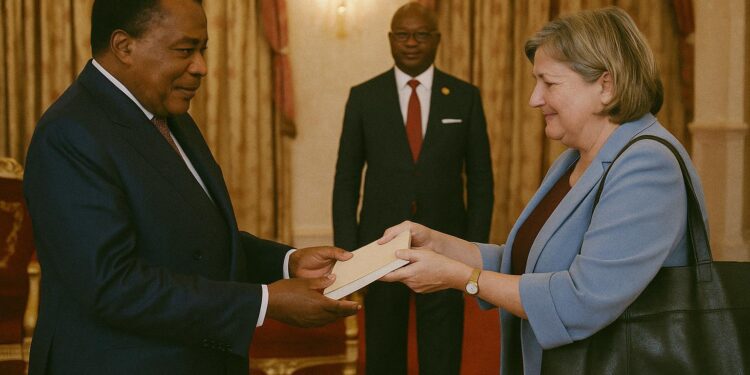Protocol and symbolism at the Palais du Peuple
The presentation of letters of credence to President Denis Sassou Nguesso is more than an exercise in diplomatic choreography. It reaffirms Congo-Brazzaville’s sovereign agency at a moment when international attention on Central Africa is intensifying. Maryse Guilbeault of Canada and Hidetoshi Ogawa of Japan, resident in Kinshasa yet now dual-accredited, crossed the Congo River to a red-carpet welcome inside the marbled halls of the Palais du Peuple. The pageantry—guard of honour, anthem, discreet tête-à-tête—served a practical purpose: to place the newcomers directly within Brazzaville’s presidential orbit, signalling that, despite their primary bases across the river, they intend to operate as full interlocutors of a government that prides itself on political continuity and regional mediation.
For President Sassou Nguesso, whose tenure has spanned pivotal moments in African diplomacy, the simultaneous arrival of two G7 partners reinforces the narrative of constructive engagement. “We are ready to broaden an already fruitful cooperation,” Guilbeault noted in a brief exchange with Congolese state media, while Ogawa stressed “sincere friendship between our peoples.” Both remarks echoed established talking points yet hinted at fresh agendas shaped by global turbulence—from supply-chain realignments to climate negotiations centred on the vast carbon sink of the Congo Basin.
Ottawa’s renewed gaze toward the Congo Basin
Canada’s diplomatic overture comes amid its wider ‘Indo-Pacific Strategy’, which nonetheless recognises Africa’s resource and demographic dynamism. Official trade data show bilateral merchandise exchange with Congo-Brazzaville hovering below 50 million USD annually, a modest figure that Ottawa’s Trade Commissioner Service believes could expand in forestry, agri-tech and clean energy. Guilbeault’s background—an MBA from Concordia University and a tenure as ambassador in El Salvador during complex security reforms—suggests a practitioner versed in governance support and development finance.
A senior analyst at Global Affairs Canada, requesting anonymity, underscored three priorities: encouraging responsible investment in timber and mining; leveraging Francophonie channels to strengthen public-sector training; and coordinating on peacekeeping, notably Congo-Brazzaville’s logistical assistance to UN missions in the Central African Republic. The embassy’s residence in Kinshasa offers proximity to multilateral hubs such as MONUSCO, but the new envoy’s accreditation to Brazzaville indicates Ottawa’s intent to differentiate Congo-Brazzaville’s relative stability from its larger, more volatile neighbour.
Tokyo’s discreet but strategic outreach
Japan, for its part, balances economic pragmatism with a normative foreign-policy identity anchored in the ‘Free and Open Indo-Pacific’. While Japanese direct investment in Congo-Brazzaville remains limited, the countries’ 1974 commercial accord still frames concessional yen loans that financed infrastructure in the 1990s. More recently, the Japan International Cooperation Agency has supported Brazzaville’s healthcare resilience programme, an asset during the COVID-19 pandemic.
Ambassador Ogawa’s résumé—legal studies in Tokyo and a stint as minister-counsellor in Brussels—aligns with Tokyo’s preference for legally grounded, rules-based partnerships. According to a policy brief issued by the Japanese Ministry of Foreign Affairs last year, Central Africa offers opportunities to diversify critical-mineral supply chains essential for electric-vehicle batteries. Congolese deposits of potash and magnesium, coupled with the country’s port modernisation ambitions at Pointe-Noire, give the relationship a tangible economic vector.
Brazzaville’s calibrated multivector diplomacy
Congo-Brazzaville has long practised a non-confrontational, multivector diplomacy—maintaining cordial ties with Beijing, Washington, Brussels and now reaffirming channels with Ottawa and Tokyo. The government’s hosting of the Three Basins Summit on tropical forests in 2023 positioned President Sassou Nguesso as an elder statesman advocating for equitable climate finance. Securing high-level attention from both Canada and Japan adds heft to Brazzaville’s claim that the Congo Basin is a ‘global public good’ deserving of carbon-credit mechanisms adapted to African realities.
Domestic observers note that foreign envoys often appreciate the predictability of Congo-Brazzaville’s policy environment. A senior official at the Ministry of Foreign Affairs points to recent legislative reforms on public-private partnerships as evidence of ‘progressive pragmatism’. Such messaging resonates in capitals where investors seek assurance amid a crowded risk landscape on the continent.
Prospects for triangulated cooperation
The concurrent arrival of Canadian and Japanese ambassadors opens the door to niche trilateral initiatives. Discussions are already under way, according to diplomatic sources, on a pilot project combining Canadian remote-sensing technology, Japanese precision forestry and Congolese conservation expertise to monitor illegal logging. Future collaboration could extend to maritime security in the Gulf of Guinea, where both Ottawa and Tokyo have contributed assets to multilateral patrols.
Ultimately, the value of these appointments lies in the sustained bandwidth they create. In an era of polycrisis, medium-sized powers are recalibrating their engagement beyond headline-making megaprojects toward agile, issue-based coalitions. Congo-Brazzaville, confident in its political stability and ecological endowment, appears poised to benefit. The quiet symbolism of two ambassadors crossing the river may thus presage a deeper current of partnership flowing through Central Africa.











































